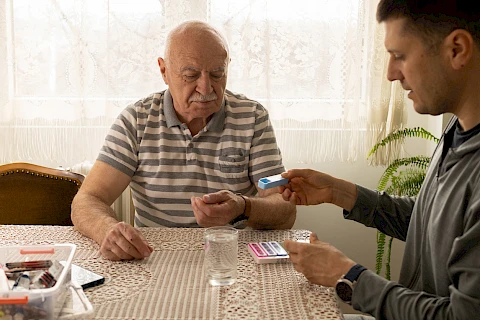
Parkinson's disease is a chronic condition that affects movement, balance, and coordination. As the disease progresses, managing daily life can become challenging. For seniors living with Parkinson's, medications play a crucial role in maintaining quality of life. These medications help control symptoms and make day-to-day life more manageable. For caregivers, properly managing Parkinson’s medications is essential to providing the best care possible, as Senior Helpers Vaughan will outline.
What to Know About Parkinson's Medications
Parkinson's medications can vary, but most aim to increase or substitute dopamine, a chemical in the brain that's often lacking in those with this condition. Common medications include Levodopa, dopamine agonists, and MAO-B inhibitors. Each of these medications works differently. For instance, Levodopa is converted into dopamine in the brain, while dopamine agonists mimic dopamine effects.
Adhering to the prescribed regimen is crucial in managing Parkinson’s medications. Each dose plays a part in maintaining symptom control, so understanding how these medications work can enhance their effectiveness.
Creating a Medication Schedule
Consistency is key when it comes to managing Parkinson’s medications. Creating a reliable schedule ensures doses are not missed and medications are taken on time. Here are some tips:
- Use a pill organizer to sort medications by day and time.
- Set alarms or reminders on your phone or another device.
- Keep a medication diary to track doses and any changes in condition.
Sticking to the schedule consistently helps maximize the medication's effectiveness, making life a bit smoother for your loved one.
Managing Side Effects
While Parkinson's medications are vital for symptom control, they often come with side effects. Some common side effects include nausea, dizziness, and sleep disturbances. Addressing these side effects promptly is a vital part of managing Parkinson’s medications. Encourage a healthy diet and adequate hydration to help manage nausea. Monitor the timing of doses to prevent dizziness and maintain a regular sleep schedule to alleviate sleep issues.
If side effects persist or worsen, contact a healthcare provider for advice. Never hesitate to seek professional help when your loved one's well-being is at risk.
Communicating With Healthcare Providers
Strong communication with healthcare providers is essential in managing Parkinson's medications. Engage in open discussions with doctors and pharmacists. Don't hesitate to ask questions about the prescribed treatments and potential side effects.
Consider asking about the expected benefits and possible side effects of each medication, how they will interact with each other, and whether adjustments are necessary based on recent changes in condition. Keeping all healthcare providers informed about changes ensures seniors receive the most suitable and effective treatment.
Get Compassionate Senior Care and Support From Senior Helpers
Managing Parkinson's medications effectively is a cornerstone of caring for someone with the disease. Caregivers can significantly impact seniors’ quality of life by understanding medications, creating a consistent schedule, managing side effects, and communicating well with healthcare providers.
Caregiving can be overwhelming, but support is available. Senior Helpers Vaughan offers specialized Parkinson's care services designed to provide the support and resources caregivers need. Contact us to learn more about our senior care services in Vaughan, Thornhill, Richmond Hill, Oak Ridges, and Newmarket. You’re not alone on this journey; support is just a call away.